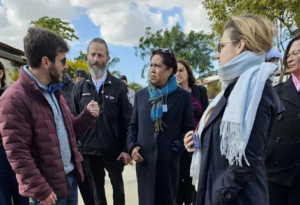UN report: Clear evidence of sexual violence, torture and rape against Israeli hostages in Hamas captivity

Posters of kidnapped Israelis in photographs taken 5 March 2024
Liza Rozovsky reports in Haaretz on 5 Mar 2024:
The United Nations special representative on sexual violence in conflict, Pramila Patten, issued a report Monday summarizing her recent visit to Israel with a team of experts, in which she determined that Hamas terrorists who invaded Israel on October 7 committed sexual violence and that this violence has continued against hostages the organization continues to hold in the Gaza Strip.
However, Patten noted in the report that team was unable to establish the prevalence of sexual violence. She also criticized the manner in which the Israeli authorities have gathered evidence of sexual violence and called on the state to cooperate with additional UN organizations in investigating the events, such as the Office of the High Commissioner for Human Rights and the Independent International Commission of Inquiry on the occupied Palestinian Territory, two organizations with which Israel does not cooperate.
In their investigation, Patten’s team viewed 50 hours of video recording captured during the attack and about 5,000 still photos. They also held 33 meetings with representatives of the Israeli authorities and security forces. The team also visited the Abu Kabir forensic institute near Jaffa and the Shura military base in central Israel, where a significant part of the dead identification process was carried out.
Patten’s report is based on confidential interviews with 34 people, including survivors and witnesses of the October 7 massacre, freed hostages that were held by Hamas and members of the search and rescue emergency services who were the first at the attack areas.
The report does not address the question of whether the sexual violence was systematic. A press release attached to the report states that “the true prevalence of sexual violence during the 7 October attacks and their aftermath, may take months or years to emerge and may never be fully known.”
The team wrote that based on the information it collected, there are reasonable grounds to believe that conflict-related sexual violence occurred in multiple locations during the October 7 attacks, including rape and gang-rape in at least three locations, namely: the Nova music festival site and its surroundings, Road 232, and Kibbutz Re’im. In most of these incidents, victims first subjected to rape were then killed, and at least two incidents relate to the rape of women’s corpses.”
The report also confirms that a number of victims, mostly women, found fully or partially naked, bound and shot at multiple locations.
Regarding reports of rape and genital mutilation at the Nahal Oz military base, the team said it did not “find a discernible pattern of genital mutilation in either female or male soldiers, though forensic analysis revealed injuries to multiple body parts, including genitalia.”
In this connection, Patten does note in the report that seven female soldiers were abducted from the base in the Gaza Strip. In addition, “Based on the information it gathered, the mission team found clear and convincing information that sexual violence, including rape, sexualized torture, cruel, inhuman and degrading treatment has been committed against hostages and has reasonable grounds to believe that such violence may be ongoing against those still held in captivity.”
The report also includes a refutation of reports concerning the massacre that took place in Kibbutz Bari. The team managed to refute, among other things, a claim that a murdered pregnant woman in Be’eri was found with as her stomach torn open with a dead fetus still in it (a claim that Haaretz has also refuted).
It was also determined that, due to the low quality of evidence, the reports that objects inserted into the genitals of women in Be’eri are false. Patten also stated in the report that her team was unable to verify a single case of sexual violence in Be’eri.

United Nations special representative on sexual violence in conflict, Pramila Patten, meeting with representatives of the Zaka emergency service in Janurary 2024
Patten also refers to her and her team’s visit to the West Bank. She emphasized, however, that they did not seek to collect information or verify claims concerning the condition of the Palestinians. This, she explained, is because this is under the jurisdiction of other UN offices that will pass on the information they collect to the organization for a report by the UN Secretary General regarding sexual violence that will be published soon.
In response to a question from Haaretz on whether the sexual violence could be attributed to Hamas and whether it was possible to determine that this was systematic, Patten replied that her team had not dealt with the attribution of crimes to a specific group that had participated in the attack. She noted that Islamic Jihad and other organizations, as well as civilians, had taken part in the attack. She added that she hadn’t thought about attribution given the amount of time she had and the fact that she was not engaged in an investigation.
Regarding the systematic nature of the violence, Patten said that she had not dealt with that either, since her mission was focused on the need to collect data and include it in the UN Secretary General’s annual report, not on an actual investigation. An investigation includes an analysis and an attempt to classify crimes, determining whether these were crimes against humanity or war crimes, she said. Her team did not deal with this, she added.
In response to the report, Foreign Minister Israel Katz said he had ordered Israel’s ambassador to the UN, Gilad Erdan, to return to Israel for consultations to protest what he called the attempt to keep quiet the severe UN report on the mass rapes committed by Hamas and its helpers on October 7. Katz wrote that he made the decision in the wake of UN Secretary-General Antonio Guterres’ failure to convene the UN Security Council to declare Hamas a terror organization and to impose sanctions on its supporters.
A statement issued later by the foreign minister welcomed what it called “the definitive recognition that Hamas committed sexual crimes by an official UN representative,” but rejected “the report’s call to investigate Palestinian claims regarding ‘sexual violence by Israeli elements.’ That is a derisive and deliberate Palestinian maneuver aimed at creating an intolerable equivalence between the horrific crimes that were committed, and continue to be committed, by Hamas and malicious and baseless claims made against Israel and Israelis.”
The statement went on to say that Israel “is calling for the immediate convening of the Security Council with the aim of designating Hamas as a terrorist organization and the imposition of international sanctions on it.”
At her press conference, Patten related to the question of why she had devoted only one day of her visit to the West Bank and six days to Israel. Patten replied that she went to the West Bank because she received information that was confirmed by the UN regarding sexual violence perpetrated by soldiers and settlers.
She said there was no need to reach any conclusions regarding the West Bank. With regard to the West Bank, she continued, there is additional information collected by other UN agencies, whereas with regard to Israel, she and her team were the only ones to have examined claims of sexual violence.
In response to a question of whether she had met survivors of sexual violence, Patten said that she had not but that she knows that some of them are undergoing treatment following the trauma they went through, and that experience around the world indicates that victims of extreme sexual violence have great difficulties talking in public. Sometimes it takes decades before they can do so.
This article is reproduced in its entirety
